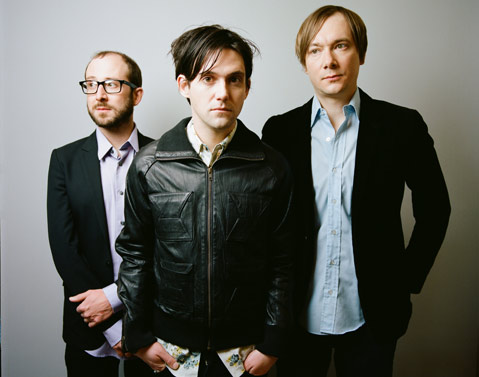Conor Oberst Talks Future Plans
Bright Eyes Brings New (and Maybe Last) Record to the Santa Barbara Bowl

Like its predecessors, The People’s Key opens with a long and winding spoken-word intro. For this, Bright Eyes’ eighth — and possibly last — full-length, frontman Conor Oberst employs the philosophical meanderings of Denny Brewer to set the mood, a mix of sci-fi future talk and reptilian creation theory that weaves seamlessly into the band’s current mode.
“You have to believe in the future,” Brewer laments, seemingly speaking to the listener and the players simultaneously. On The People’s Key, Oberst and his longtime Bright Eyes cohorts (multi-instrumentalist/producer Mike Mogis and pianist/trumpeter Nate Walcott) have traded in their dusty, acoustic-folk sound for a more polished approach, complete with rich organ tones, rocking guitar lines, and crisp, clean drum tracks. In turn, the notoriously confessional Oberst has also flipped the switch, dishing out some of the most vague and imagery-filled lyrics of his career.

That The People’s Key is alleged to be Bright Eyes’ last recorded effort is only part of its mystique; the album also finds onetime wunderkind Oberst moving away from his most familiar forms, forging a new musical path and, in conversation, talking candidly about growing older, looking back, and planning for the future.
It’s been four years since the last Bright Eyes record. What prompted the reunion? It was just sort of a timing thing—between me and Mike [Mogis] and Nate [Walcott] and our lives — in terms of making a record again all together. For me, when I made my first solo record, it was important for me to make a record without Mike, just because he had been such a safety net to me for so many years. I kinda just wanted to see if I could do it. That was something I felt at the time that I really needed to do. And, like anything, it’s good to have a break from something; you don’t take things for granted that way. Just being back together this year has been so nice, and we all felt really fresh, like we’re starting over again. And that’s a good mindset to be in if you’re going to go on tour for a year. [Laughs]
Did the dynamic between the three of you change at all? It’s pretty much picked up right where it left off. [Laughs] I’d like to think that we’re a little older and wiser — well, I know we’re older, and I think we’re a little wiser — and that we’ve learned from all these years of doing this. But both Mike and Nate are two of my best friends. We still really enjoy each other’s company, and I think that’s really important.
I want to talk a bit about The People’s Key. How did Denny Brewer come into the mix? We have kind of a tradition of starting each record with a sound collage, which a lot of times involves some sort of dialogue or spoken-word component, so we knew we wanted to start the record with that same approach. When I was thinking about what would be appropriate, I realized that a lot of the seeds to the songs [on The People’s Key] had been planted a couple of years before, when I was making [Outer South] down in El Paso — that’s where I met Denny and his son and first heard their music. I had a lot of late-night conversations with them, and it struck me that his voice and his words would be a perfect thing to fill that part of the record. … I just think the sound of his voice and the subject matter, maybe at first it can be a little off-putting to listeners, but if you listen to it and listen to the substance of the songs, I think it works well.
It also plays nicely off of the less confessional, more ambiguous lyrics that you’ve written. Yeah, I think in the best-case scenario; I think the intro should put the listener in the right sort of frame of mind to get into some more of the lyrics. [The People’s Key] is certainly more abstract and less narrative-driven than some of our other records, but I think it’s always good to try new things, to experiment. That’s always been our code as a band, to always try and experiment and not repeat ourselves.
After 10 years of music making, how do you keep from falling into patterns? I think just trusting each other. Between Mike, Nate, and I, sometimes one of us will have an idea that the others are like, “Whoa, really? You want to do that?” Even in the studio, we’ll be working on a part or an idea, and it just doesn’t work out and you scrap it and move on. I think, for the most part, just being willing to take those risks and try new things and trust each other’s impulses I think is really important. It’d be hard to do it on my own. Working with other people really pushes you to come up with new ideas and new approaches.
If you could impart some wisdom on 13-year-old you, what would it be? I don’t know. Maybe it sounds a little cheesy, but I think that every mistake or less-than-perfect circumstance I’ve experienced has sort of helped me get to where I am now. With the exception of a few nights along the way, I probably would do pretty much the same thing. [Laughs] I don’t think it’s ever good to know too much.
So, what’s next? That is the big question for me. It’s actually something I’ve not been having anxiety about, but just thinking about more. When we started this year, it seemed like we were going to be on tour forever, so there was no point in planning much life beyond that. But now I definitely can see the end of the tunnel. I don’t know. I think that I’d definitely like to chill out for a few months, but I can’t imagine … I imagine next year I’ll probably do some writing and recording. I guess there’s no set plan, but I’m pretty bad at not being busy. I imagine I’ll figure something out.
4•1•1
Bright Eyes play the Santa Barbara Bowl on Sunday, September 25, at 7 p.m. with opener Kurt Vile & The Violators. For tickets, call 962-7411 or visit sbbowl.com.



